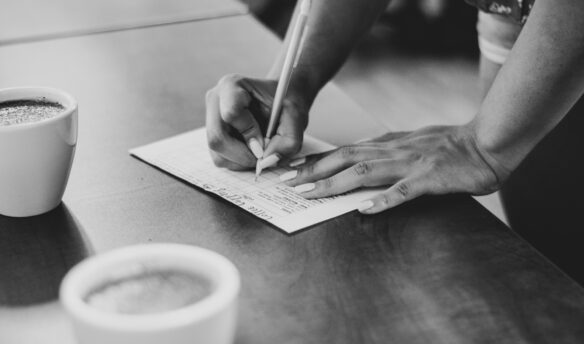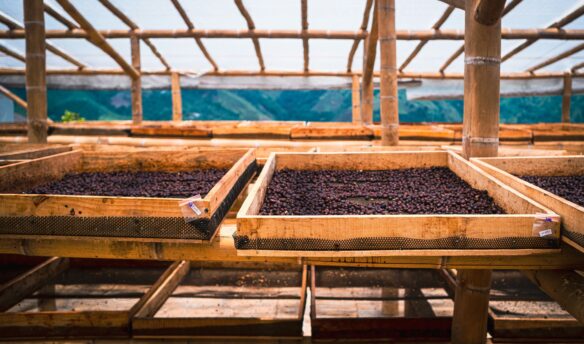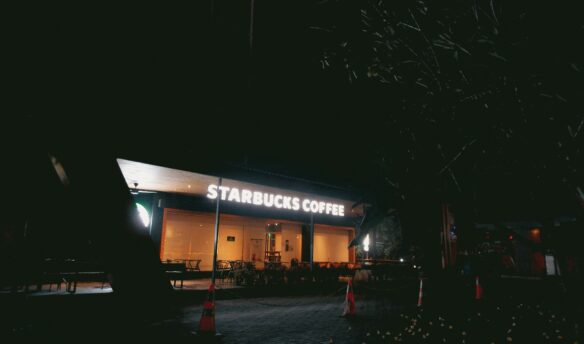Sleep deprived? Science says try decaf. Plus, experiments to breed climate-proof coffee and count the president of El Salvador as the latest to start a celebrity coffee brand.
‘Inside a New Experiment to Find the Climate-Proof Coffee of the Future’ – via Grist
As the world heats and weather patterns grow less predictable, coffee farming becomes more difficult. Production has fallen in many countries, yet global demand increases yearly.
Trying to bridge that gap and keep coffee farming feasible means investing in research and innovation, including breeding new varieties that can withstand climate change.
A report by Grist, in collaboration with Roast Magazine/Daily Coffee News, looked at the work of World Coffee Research (WCR) and its massive new breeding project, Innovea. According to WCR CEO Vern Long, the project’s goal “is to develop trees that are optimized for a range of production environments—and ultimately give farmers more climate-resilient options.”
Building on prior WCR research, the Innovea project involved creating 30 new coffee varieties and shipping 5,000 resulting seeds to government researchers in nine partner countries. The seeds will be planted in various locations, and after six years, the varieties with the most promising traits will be used for further trials or additional crossbreeding. “The idea is to identify the genes we’re looking for and move on with those plants instead of others,” said Jane Cheserek, lead breeder at Kenya’s Coffee Research Institute.
Because coffee trees are relatively slow-growing, the timeline for this project is long. WCR “expects to make 100 new pre-commercial varieties available for trials by 2030 and will then work with partner governments to release a subset of those to farmers as soon as 2036,” the Grist article states. Notably, the resultant varieties will be owned by governments rather than individual companies or WCR itself.
The article points out that climate-resistant coffee varieties won’t solve everything—techniques such as agroforestry and soil regeneration are also needed. There also need to be mitigations on the consuming end that focus on reducing carbon consumption.
We imagine future discussions will also include focusing on the economic realities of coffee farming. For example, how are producers supposed to invest in climate mitigations and new varieties when they struggle to make a living from coffee?
‘Your Cup of Coffee Is Already Expensive. It’s About to Get Even Worse’ – via Bloomberg
That’s right, it’s another chapter in the ongoing “your coffee is getting more expensive” series. However, this article from Bloomberg is slightly different and addresses more of the context—and fallout—of why coffee prices fluctuate.
The article goes through the various issues currently impacting the industry: lower production in Vietnam and Brazil has pushed the commodity price of both arabica and robusta up. At the same time, growing demand in places like China has increased competition for whatever coffee is available.
These factors, coupled with companies rushing to secure green coffee before the impending European deforestation legislation kicks in, have created a perfect storm of high costs and soaring retail prices.
Bloomberg reported how these things affect multinationals like JM Smucker and Starbucks, but the article also looks at how this storm impacts farmers and smaller coffee brands. Several business representatives told Bloomberg that they have held off raising prices for as long as possible.
“But it’s just not something anyone can avoid anymore,” said Patrick Grzelewski, director of coffee at Variety Coffee Roasters in New York. Another business owner noted that their green coffee suppliers weren’t able to give them a fixed price because costs fluctuate—that means prices change daily.
“There’s also a growing recognition that coffee traders and roasters have long been underpaying farmers, a trend some buyers are trying to reverse to make the industry more sustainable,” Ilena Peng writes. “If coffee prices don’t go up for growers, there won’t be any reason for them to maintain long-term production.”
Read the full story here or via Yahoo! News here.
‘El Salvador President Bukele Launches Coffee Brand with US Business Ties’ – via Daily Coffee News
We’ve seen actors, musicians, sports stars, Youtubers, and even bankrupt ex-politicians start coffee companies. But have we ever had a sitting head of state—from a coffee-producing country, no less—form their own coffee brand?
El Salvador President Nayib Bukele has launched Bean of Fire, a US-based brand selling coffee grown in El Salvador along with beans from Ethiopia, Kenya, and Indonesia. The brand “has nothing to do with politics,” Bukele wrote on X, “it’s been my passion project this last year.”
Bukele said one of his goals for Bean of Fire is to support Salvadoran businesses and encourage expats to return home. Bean of Fire will donate coffee, sugar, and cups to a different business daily, which Bukele hopes will incentivize Salvadorans to return to the country and invest in local businesses.
Bukele tweeted that these donations would be subsidized by coffee sales in the US: “So basically, the coffee you pay for in the U.S. is free in El Salvador.”
Daily Coffee News points out that having a coffee-producing country’s sitting head of state-run a private coffee company could lead to conflicts of interest. As the US found out with President Trump, while such arrangements can be legal, they still come with fraught ethical considerations.
More News
‘Panera Brands Reportedly Exploring $1.5bn Sale of Caribou Coffee and Einstein Bros Bagels’ – via World Coffee Portal
‘Starbucks Morning Coffee Ritual Disrupted by IT Outage’ – via Bloomberg
‘Pachamama and Pact Win Gold at 2024 Sustainable Food Awards‘ – via Daily Coffee News
‘Members Of *NSYNC And The Backstreet Boys Team Up To Sing About Iced Coffee‘ – via Sprudge
‘Activist Elliott Builds Stake in Coffee Chain Starbucks’ – via Financial Times
‘Drones to Deliver Coffee in Melbourne‘ – via Bean Scene Magazine
‘Keurig Dr Pepper to Close Virginia K-Cup Plant‘ – via Manufacturing Dive
’25 Years of Cup of Excellence‘ – via Global Coffee Report
Is Coffee Good For You?
We’ve all used coffee to get the caffeine boost after a sleepless night. However, according to new research by a group of academics from Switzerland and Germany, after too many restless nights, caffeine can actually be counterproductive to your brain’s ability to recover from sleep deprivation.
Previous studies have shown that just one night of sleep deprivation can decrease the volume of gray matter in the brain, especially “in regions involved in memory, sensation perception and conscious thought,” Newsweek reports. Daily caffeine consumption has also been shown to reduce gray matter volume. Researchers hypothesized that coffee consumption could exacerbate the effects of sleep deprivation on gray matter loss.
The study, published in Scientific Reports, took 36 healthy volunteers and gave them varying sleep schedules over nine days, culminating in five days of sleep restriction (defined as five hours of sleep). Nineteen participants had 300mg of caffeine, or three cups of coffee per day, during the sleep-restricted day, while the other 17 had the same amount of decaf.
Using MRI data taken at various points throughout the study, the researchers found that the caffeine consumers lost gray matter, suggesting that caffeine might hinder how the brain reacts to lack of sleep and exacerbate the negative impacts of sleep deprivation.
The decaf drinkers actually gained gray matter. “It was somewhat surprising to us to observe an increase, instead of a decrease in gray matter in the participants without caffeine after chronic sleep restriction,” the two lead authors told PsyPost.
However, the authors noted that previous research has shown gray matter can increase after sleeplessness. This could be the brain’s way of counteracting a lack of sleep in the short term.
The researchers also pointed to potential issues with the study, such as the size of the sample pool and the fact that MRI scans can show increases and decreases but can’t explain why those changes occurred. They said future studies could use additional scanning technologies to examine the changes more accurately.
Beyond the Headlines
‘We Should All Be Concerned—and Angry—About What’s Happening at Compass Coffee’ by Ashley Rodriguez
‘Pret A Manger: The Decline of the ‘Free’ Coffee’ by Lucy Clarke-Billings
















